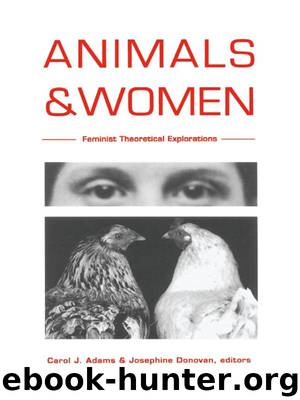Animals and Women: Feminist Theoretical Explorations by Carol J. Adams & Josephine Donovan

Author:Carol J. Adams & Josephine Donovan [Adams, Carol J. & Donovan, Josephine]
Language: eng
Format: epub
ISBN: 9780822316671
Amazon: 0822316676
Publisher: Duke University
Published: 1995-11-13T23:00:00+00:00
* * *
Notes
It would be impossible to identify all the conversations and exchanges that contributed to this essay. Still, I know that my thinking in this area has been challenged and sharpened by a number of my students—most notably Neysha Stuart, Karen Villemaire, and Linda Clark—and by my friends and colleagues Judy Anhorn and Gail Wheeler. Marti Kheel has heard every idea and example in this article in some form or another, and has been an inexhaustible source of ideas and examples of her own. She deserves much credit, then, for anything that seems insightful, wise, or provocative; the pedestrian thinking, however, is entirely my own.
1.I owe the notion of narrative and template, with text creating text, to Judy Anhorn.
2. There are a number of excellent works on the history of environmental consciousness and attitudes toward nature. In particular, I recommend Carolyn Merchant, The Death of Nature (New York: Harper & Row, 1978); Roderick Nash, The Rights of Nature: A History of Environmental Ethics (Madison: University of Wisconsin Press, 1989); Keith Thomas, Man and the Natural World: A History of Modern Sensibility (New York: Pantheon, 1983); and Max Oelschlaeger, Contemporary Wilderness Philosophy: From Resourcism to Deep Ecology (New Haven: Yale University Press, 1991). Former Secretary of the Interior Manuel Lujan summed up the traditional position when he stated his own worldview: "I believe that man is at the top of the pecking order. I think that God gave us dominion over these creatures" (Ted Gup, "The Stealth Secretary," Time, 25 May 1992, 58).
3. Although it seems paradoxical that animals may be killed at the whim of their "owners" but not treated cruelly, the explanation is simple: acts of brutality, or even exposure to those acts, have long been considered demoralizing to humans. See the discussion of the American Society for the Prevention of Cruelty to Animals (ASPCA) and its founder Henry Bergh in Gerald Carson, Men, Beasts, and Gods: A History of Cruelty and Kindness to Animals (New York: Scribner’s, 1972), 95–106, esp. 105.
4. In a letter responding to an excerpt from Jeremy Rifkin’s book Beyond Beef, which had appeared in the Utne Reader, the editor of a meat industry journal took exception to a half dozen facts ranging from the weight of the world’s cattle to the percentage of methane gas attributable to them. Rifkin responded by elaborating on the initial information to "prove" that beef consumption is indeed harmful to humans. At the conclusion of his response, he stated the Beyond Beef Campaign’s goal: to reduce U.S. beef consumption by at least 50 percent "to improve our health, preserve the environment, alleviate world hunger, and decrease animal suffering" (emphasis added; Utne Reader, May/June 1992, 8–9). This was the only time in the whole exchange that the concern of any nonhuman being was raised. For those of us who believe that animal suffering is the central issue, the relegation of animals’ concerns to fourth place is at best disingenuous and at worst a reflection of the low regard in which they are held.
Download
This site does not store any files on its server. We only index and link to content provided by other sites. Please contact the content providers to delete copyright contents if any and email us, we'll remove relevant links or contents immediately.
On the Front Line with the Women Who Fight Back by Stacey Dooley(4307)
The Lonely City by Olivia Laing(4113)
The Rules Do Not Apply by Ariel Levy(3899)
Bluets by Maggie Nelson(3705)
The Confidence Code by Katty Kay(3562)
Three Women by Lisa Taddeo(2916)
Inferior by Angela Saini(2829)
A Woman Makes a Plan by Maye Musk(2825)
Pledged by Alexandra Robbins(2789)
Not a Diet Book by James Smith(2715)
Confessions of a Video Vixen by Karrine Steffans(2669)
Nice Girls Don't Get the Corner Office by Lois P. Frankel(2591)
Wild Words from Wild Women by Stephens Autumn(2584)
Brave by Rose McGowan(2497)
The Girl in the Spider's Web: A Lisbeth Salander novel, continuing Stieg Larsson's Millennium Series by Lagercrantz David(2379)
The Clitoral Truth: The Secret World at Your Fingertips by Rebecca Chalker(2240)
Why I Am Not a Feminist by Jessa Crispin(2237)
Women & Power by Mary Beard(2221)
Women on Top by Nancy Friday(2120)
